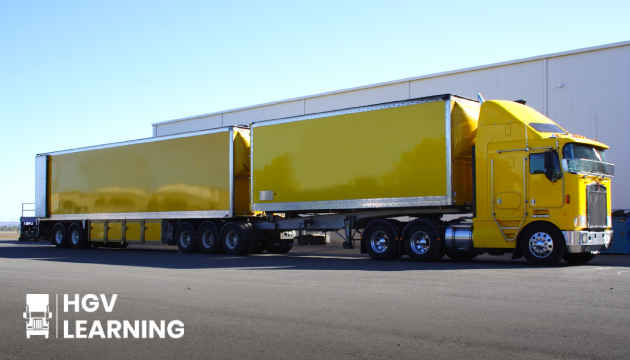Related Articles

15/07/2025
Understanding the Different Classes of HGV Licence

08/07/2025

Driving a rigid lorry can open up a world of opportunities in the transportation industry. These sturdy vehicles, commonly used for delivering goods, require a specific set of skills and qualifications.
If you’re interested in pursuing a career as a rigid lorry driver, it’s essential to understand the requirements and steps involved.
In this article, we will guide you through everything you need to know to get behind the wheel of a rigid lorry. You can learn more about the HGV licence cost here.
Before delving into the requirements, let’s first familiarise ourselves with rigid lorries. A rigid lorry, also known as a rigid truck, is a type of commercial vehicle consisting of a cab and a cargo-carrying body attached together. These lorries are commonly used for local and regional transportation, delivering goods to various destinations. Rigid lorries come in different sizes, ranging from small vans to large trucks with multiple axles. They are designed to transport goods efficiently and safely on roads.
To drive a rigid lorry, you need to hold the appropriate driver’s licence. The licence categories for rigid lorries are as follows:
The Category C1 licence allows you to drive rigid lorries weighing between 3,500kg and 7,500kg. This licence is suitable for driving smaller rigid lorries commonly used for local deliveries. To obtain a Category C1 licence, you must pass both the theory and practical tests specific to this licence category.
The Category C licence is required to drive rigid lorries over 7,500kg. With this licence, you can operate larger rigid lorries, including those with multiple axles. Obtaining a Category C licence involves passing the theory and practical tests tailored to this licence category.
In addition to the appropriate licence, you must hold a Driver Certificate of Professional Competence (CPC). The CPC is a qualification that aims to improve road safety and enhance the skills of professional drivers.
To obtain a CPC, you need to pass both the theory and practical tests covering areas such as vehicle safety, driver hours, and professional driving techniques.
To drive a rigid lorry, there are age restrictions that must be considered. The minimum age requirement for a Category C1 licence is usually 18 years, while for a Category C license, it is typically 21 years. However, it’s important to note that age requirements may vary depending on the country or region you reside in. Check with the local transport authority to ensure you meet the specific age criteria.
Being in good health is crucial for operating a rigid lorry safely. Before obtaining a license, you must meet certain medical fitness standards. These standards ensure that you have the physical ability to handle the demands of driving a large vehicle.
Clear vision is essential for safe driving. You will need to meet specific eyesight requirements, including having a minimum visual acuity and peripheral vision. Regular eye tests are recommended to maintain your eyesight and meet the necessary standards.
Apart from eyesight, general health assessments are conducted to determine your fitness for driving a rigid lorry. These assessments may include checks for conditions that could affect your ability to drive safely, such as cardiovascular issues, epilepsy, or diabetes. It’s important to disclose any relevant medical information during these assessments.
To obtain the necessary licences, you must pass both theory and practical tests specific to the category of rigid lorry you wish to drive.
The theory test is designed to assess your knowledge of road safety, traffic regulations, and the specific requirements for driving a rigid lorry. It typically consists of multiple-choice questions and hazard perception tests. Study materials, including official driver’s manuals and online resources, can help you prepare for the theory test. Familiarise yourself with topics such as traffic signs, speed limits, vehicle maintenance, and safe driving practices.
The practical test is the practical demonstration of your driving skills and ability to handle a rigid lorry. A qualified examiner will assess your competence in various driving manoeuvres, including reversing, parking, and navigating different road conditions. During the test, it’s essential to demonstrate good observation, control, and decision-making skills. Practice with a qualified driving instructor beforehand to gain confidence and improve your driving abilities.
While obtaining the appropriate licence is the first step, further training and qualifications can enhance your career prospects and make you a more competitive candidate in the job market.
Driver CPC training is mandatory for professional drivers and involves periodic training sessions to maintain and develop your skills throughout your career. This training covers topics such as road safety, efficient driving techniques, and customer service. Undertaking CPC training demonstrates your commitment to continuous improvement and professionalism as a rigid lorry driver.
If you plan to transport hazardous goods, obtaining an ADR certification is essential. ADR certification ensures that you understand the regulations and safety precautions associated with transporting dangerous substances. This qualification covers topics such as identifying hazardous materials, emergency procedures, and proper handling and storage of dangerous goods. Holding an ADR certification expands your job opportunities within the transport industry.
When driving a rigid lorry, it’s crucial to have appropriate insurance coverage. As a professional driver, you may need specific commercial vehicle insurance to protect yourself, the vehicle, and the cargo you transport. Consult with insurance providers specialising in commercial vehicle coverage to ensure you have the necessary protection and comply with legal requirements.
Once you have obtained the required licence and certifications, a wide range of employment opportunities await you as a rigid lorry driver. You can explore roles in logistics companies, delivery services, construction companies, and even consider self-employment as an owner-operator. Research local job boards, industry-specific websites, and transport companies to find suitable job openings that match your skills and preferences.

15/07/2025

08/07/2025
Complete the form below and we’ll contact you asap.

